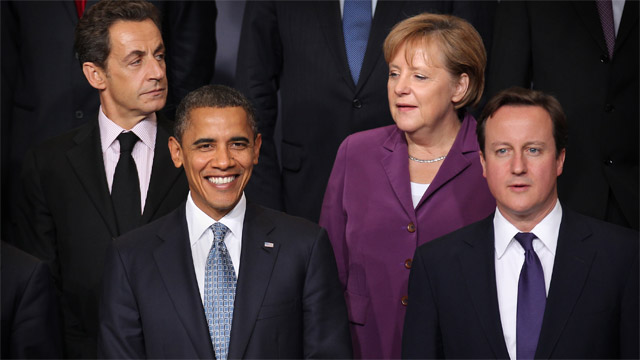
From James Joyner, the New Atlanticist: The late-night comedian Jon Stewart’s quip that “the U.S. handing Libya over to NATO is like Beyoncé saying she’s ceding control to Sasha Fierce” constantly came to mind as the fight dragged on. Yes, Gadhafi was ultimately ousted — after six months — with a European face on the fight. But it came at the cost of undermining our partners’ confidence in American leadership as well as rendering hypocritical our complaints about European “caveats” in Afghanistan.
Second, the fight has both reaffirmed my belief that NATO is an absolutely vital vehicle for transatlantic cooperation and underscored my fear that it is structurally unsound. Headline writers to the contrary, the toppling of the Gadhafi regime is an unqualified success for the Alliance. Who else could have, in short order, coordinated a complex operation with American, Canadian, European and Arab states? Certainly, not the European Union. Nor was the French offer to simply lead in an ad hoc fashion acceptable to Qatar, the United Arab Emirates and others. Years of working and training together under a stable institutional framework had created vital trust.
At the same time, however, the lack of investment in defense infrastructure that so many of us have been warning about for years — and that Bob Gates so eloquently outlined in his parting shots as U.S. defense secretary — was laid bare in the skies over Libya. . . .
In the UK and France, by contrast, the combination of war weariness and the ravages of the economic crisis have forced austerity. Two countries who stood astride the world for centuries — frequently in direct competition with one another — by virtue of their ability to project military power are now reduced to sharing a single aircraft carrier. With massive unemployment and the demands of large welfare states, the political will to spend on defense just doesn’t exist. Yet, this has not thus far been met with a decreased appetite to project power. . . .
At the Lisbon Summit last November, the Alliance put out a new Strategic Concept that paid lip service to a bold, ambitious future. At the time, many of us praised the words but noted that they would have to be followed by deeds. Ironically, the victory in Libya has demonstrated the hollowness of the words.
When they meet in Chicago next May, it will be time to re-align NATO’s strategic ambitions with its capabilities and will.
Image: transatlantic-contradictions.jpg
